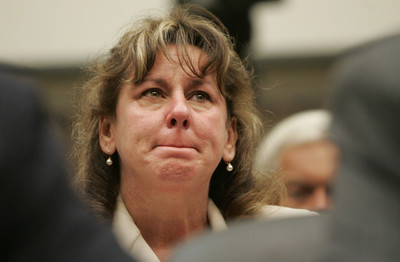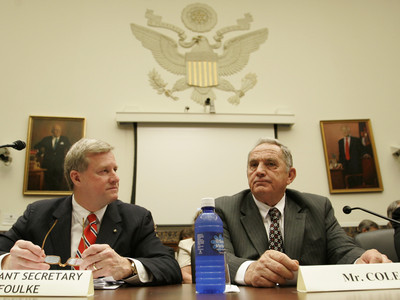Construction safety examined
WASHINGTON -- George Cole said he did not want his brother-in-law's death in October from a 59-foot fall at the CityCenter construction site to have been in vain.
So Cole shared his family's anger and grief with lawmakers on Tuesday, as the death of ironworker Harold "Rusty" Billingsley Jr., sparked a congressional examination of safety practices at Las Vegas megawork sites and how state regulators punish -- or don't punish -- violators.
Billingsley was one of a dozen construction workers who have died on Strip projects in the past 18 months, more than were reported during the prolonged Las Vegas building boom of the 1990s.
A majority of union workers at CityCenter, a $9.2 billion project of MGM Mirage, went on a one-day strike two weeks ago over safety concerns.
Six workers have died at CityCenter. Construction deaths also have occurred at Echelon, Cosmopolitan, Trump, Palazzo and Fontainebleu projects that are remaking the Las Vegas Boulevard.
Nationally, the construction industry is in the midst of "a safety and health crisis," said Mark Ayers, president of the Building and Construction Trades Department of the AFL-CIO.
An average of four construction workers are killed daily, Ayers said. High-profile incidents such as two crane collapses in New York City in which nine men died have focused the public's attention on the problem.
At a hearing called by Rep. George Miller, D-Calif., chairman of the House Education and Labor Committee, Cole said he blamed the federal Occupational Safety and Health Administration for his brother-in-law's death.
"Rusty's death was not his fault," Cole said. "There are two problems here: the unsafe conditions at the workplace and OSHA's failure to enforce its own standards as they were written."
The agency in 2002 changed an enforcement directive that had required contractors to erect temporary flooring or netting two floors or 30 feet beneath high-rise workers to catch those who fall.
Edwin Foulke Jr., federal director of OSHA, said the change was negotiated with contractors and labor officials and was intended to provide "100 percent fall protection" by requiring all workers in most cases to wear secured harnesses that would theoretically break their falls.
But Cole said the compliance directive was regularly misinterpreted at Las Vegas work sites. Cole, a retired ironworker and building contractor, sat next to Foulke at the witness table but rarely glanced over as the federal official spoke.
And accidents can still happen. On Oct. 5, Billingsley fell through a hole in a piece of flooring, and a harness safety cable was not attached. There was no flooring or netting below to stop his fall.
"On that day, I lost my brother and gained a statistic," Cole said.
Flooring or netting could have saved his brother-in-law, Cole said.
"I know for a fact an ironworker that's alive on a 30-foot fall," Cole said. "I don't know one at a 60-foot fall."
Cole was accompanied by his wife, Monique, who is Billingsley's sister.
Seated behind her husband, she looked down and dabbed her eyes as he described his brother-in-law as energetic and fun-loving, a "kind and generous man."
Cole said the family was further devastated when they learned that Nevada's state OSHA withdrew all safety citations and $13,500 in preliminary fines against Billingsley's employer, SME Steel Contractors.
The decision was made following a private meeting between state administrators and the subcontractor, where by law the family was not invited to attend.
Miller said he was troubled by the practice, by which Nevada OSHA also withdrew or reduced safety infractions in other construction worker deaths.
"The relationship that appears in Nevada doesn't look like it is a healthy one for workers," Miller said.
Miller noted four of the fatalities involved Perini Building Co., the general contractor for CityCenter, "and yet fines continue to be reduced. There is something wrong with that enforcement plan."
"I don't get how you can have an injured worker, or a worker who has died and you can have an informal process in which the worker's family or the union or even other workers at the site are not included," Miller said. "That doesn't pass the smell test."
Foulke said he did not know the facts of Billingsley's death and could not speak for Nevada OSHA, which enforces federal safety laws but also can put stronger protections in place.
Responding to the spate of fatalities, the state agency in May announced it was changing state policy to require contractors to install temporary flooring or safety nets on high-rise projects.
Miller also questioned whether fines can be sufficient to force safety changes on megaprojects such as CityCenter.
"I worry that these fines are of no real value," he said.
Miller noted New York City actively issues stop-work orders at unsafe sites, But, he said, the CityCenter project "is a tough project to put a stop work order on."
"This project in Nevada looks a little bit like a test case here," Miller said. "There are fatalities and injuries that have taken place and the number one tool in the arsenal, which is fines, continues to get waived.
"That raises very, very serious questions about that state enforcement and what the federal government has the ability to do."
After the hearing, George and Monique Cole said they were satisfied that lawmakers understood their concerns.
"I am satisfied with the testimony," George Cole said. "How it turns out is still to be seen."



















